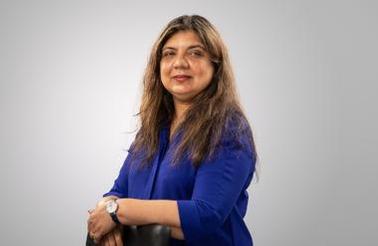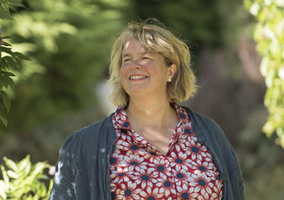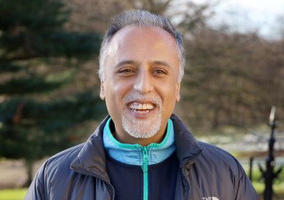Zinthiya Ganeshpanchan was born in Sri Lanka and grew up in a climate of civil unrest, social oppression and witnessed abuse and violence against women and girls.
When she moved to the UK in 2000, she saw some of the same issues replicated here, but in “different” and “less obvious” ways.
“I realised no matter where I worked, whether it be Sri Lanka or here, I can make a change,” she says.
Ganeshpanchan set up the eponymous charity the Zinthiya Trust in 2009, which supports women and families who are fleeing abuse or are from disadvantaged backgrounds.
Nearly 15 years later, she now plans to pass over control to a new leader.
‘There were no places for women of colour to go’
Zinthiya Trust is based in Leicester, one of the most ethnically diverse cities in the UK.
Ganeshpanchan says she founded the Zinthiya Trust because while there were “traditional” domestic abuse organisations available to people in the area, there were fewer places specifically set up for women of colour.
“There were no places for women of colour to go – or when they went, they were not getting the support services they need, because we were always labelled as Black ethnic minority, whilst not understanding we have different, intersecting issues that govern our lives.”
She says that in a previous role, she saw the same solution being used for all problems despite the differences apparent in beneficiaries.
“I realised that there needed to be something culturally sensitive, but equally challenging those cultural norms.
“Because it’s very easy for people to say: ‘This is a cultural practice that I’ve been brought up with and therefore, it’s the right thing.’ But no, if it’s a forced marriage, it’s not right, no matter where it happens. But then I can tell that but if a white person challenged it then the person would be called a racist.”
Avoiding ‘lazy equality’
Ganeshpanchan says charities should avoid using the terms BAME and BME as they can exclude other ethnic minority groups such as Gypsy and Roma communities.
She says they are unhelpful labels that can detract from the individuality of a person and pigeon-hole them.
However, the term ethnic minority can also be problematic as people of colour collectively form a global majority, she says.
Some organisations practice “lazy equality”, she says, “because everybody wants to be providing equality, but they want it very basic and they’re very lazy and not thinking it through”.
More money has been awarded to charities working with or led by people of colour since the Covid-19 pandemic, she says, but this is not necessarily as positive as it sounds.
“Just because funding was not given to these people traditionally, suddenly waking up overnight and thinking it’s all a quick fix by just throwing a pot of money at it is not going to solve the problem. It has to be more thoughtful.”
She says charities recruiting more people from ethnic minority backgrounds can be tokenistic, too.
“They think: ‘Oh, yes, we’ve filled in a seat, so that’s enough.’ But what are you doing to support and empower that person?
“We as a charity have always stuck with taking the person-centred approach to people’s lives. Because when somebody comes to us as a beneficiary, we don’t look at the person’s colour of the skin or their religion. We think: ‘What does this person need to change their lives? What does this person need to live a fulfilling life? To be empowered?’ We look at the person.”
She says she would like the sector to become more diverse, not just in terms of race but with “skills and attitudes”.
“I’d like to see people from other sectors joining the charity sector from businesses because there’s an awful lot that we can learn from each other. For me, it’s about the diversity piece not just about race. It’s a lot more than that. It’s about attitudes.”
‘Income is vanity, reserves are sanity’
First working as a trustee, Ganeshpanchan became CEO of the charity in 2014.
At the time, the average salary for a charity CEO was between £40,000 and £50,000, which the charity was unable to pay. With some financial support from her husband, Ganeshpanchan was able to take on the role herself with a salary of around £25,000. Today, she earns about £44,000.
Since becoming CEO, Ganeshpanchan has overseen a period of growth at the charity.
According to its accounts for the year ending March 2022, the Zinthiya Trust had a total income of £816,000, with grants from foundations accounting for 96% of this.
The charity’s income more than doubled from 2019-20, when it sat at £405,000, but Ganeshpanchan says this was largely because of emergency Covid-19 funding.
The charity’s income for the year 2022-23 will dip to around £720,000, she says.
“We’re in a much stronger position, even though the income has not drastically increased the way that it did during Covid time, which we’re happy about.
“I think for our charity, sustainability is more important than income. I would say income is vanity but having reserves is sanity.”
Closing reserves for March 2022 were at £330,000 – an increase of over £60,000 on the year prior.
‘Running a charity is more complex than running a business’
When asked about the biggest challenges facing the charity sector, Ganeshpanchan says running services with limited resources.
“Resources are always going to be scarce in the charity sector. There’s never going to be a day where charities put their hands up and say: ‘We have enough money,’ because it’s always going to be scarce. But the challenge is how are we going to use those limited resources to deliver our support services?”
While charities are told to run like businesses, they are held to a higher standard than them, Ganeshpanchan says.
“I think running a charity is more complex than running even a business because you have to juggle so many things and with the very limited resources you have to make things happen.”
Charities have to manage their reputation, resources and people’s expectations while providing the best services for their users, she says.
“You have to maintain those standards. Not only as a charity but also as an individual. Especially in my case, my reputation is my charity’s reputation. So, it goes hand in hand.
“We have to make the best choices because maintaining those standards is the right thing to do. But it’s not always easy because we always will face issues with staff, service users and beneficiaries and sometimes we have to make hard decisions.”
Planning to take a step back
After leading the charity for over a decade, Ganeshpanchan says she will be looking to take a step back and find her replacement over the next few years.
She is looking for her successor, with the idea that they may work under her for a year or two before she steps down.
“It’s not because I have lost the passion to do what I do or anything like that. But now I think, having learned on this job, having delivered the services and successfully delivering this and growing the organisation over some challenging periods.
“I have the skill set and knowledge which I would like to use to support other organisations, other smaller grassroots organisations because I know if I had somebody to show me the way when I first started, maybe we would’ve grown even larger than this.”











